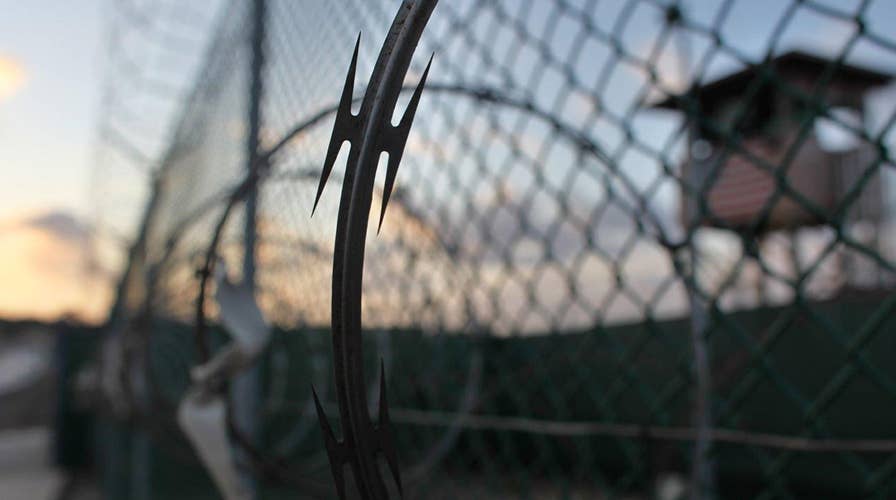Pentagon: A dozen prisoners to be transferred from Gitmo
Jennifer Griffin reports from Washington, D.C.
The next round of Gitmo transfers will begin this weekend with two detainees going an undisclosed country in Africa, a U.S. official told Fox News.
In January, the Pentagon conducted a bulk transfer of 10 detainees at once, the largest transfer from the U.S. Naval Station at Guantanamo, Cuba to date.
This next transfer of Gitmo detainees can't happen all at once because the Pentagon is required by law to notify Congress 30-days before any transfers.
Capitol Hill sources tell Fox News that period has not elapsed yet for all the transfers.
The first notification went to Congress in early March and the second one in the middle of this month.
The first transfer of two detainees will begin this weekend, and the rest are expected in the middle of next month.
All told, the number of detainees in these next two rounds will be about a dozen.
There are 91 detainees remaining at Gitmo. Thirty-five have been cleared to transfer to other countries.
A Pentagon spokesman would not confirm the transfer of any Gitmo detainees beginning this weekend.
“I do not have a timeline on when particular detainees will be transferred from Guantanamo. However, the Administration is committed to reducing the detainee population and to closing the detention facility responsibly,” Cmdr. Gary Ross, a defense department spokesman, told Fox News.
In the past, the Pentagon only confirmed detainee transfers once they are completed. The detainees fly in US military aircraft to their third-party nation.
In a startling revelation, days ago the Pentagon's point man for Gitmo said that some of the detainees transferred from the prison have in fact re-joined the fight and worse.
Congressman Dana Rohrabacher, R-Calif., asked Paul Lewis, the defense department’s envoy for the prison many lives have been lost after detainees had been transferred.
“Unfortunately, there have been Americans that have died because of GITMO detainees,” said Lewis.
The Pentagon a short time later issued a statement saying that only 5% of detainees who have been released have returned to the battlefield during the Obama administration. Pentagon officials don't believe those detainees are among those who have killed Americans.
In January, the Defense Department released new statistics saying the number of former Gitmo detainees suspected of re-engaging in terrorism doubled from six to 12.
Senator McCain refuted the administration’s statistics. He believes more released Gitmo detainees return to the battlefield putting more American lives at risk.
“We know for a fact that roughly 30 percent of those who have been released have re-entered the fight, and usually at a very high level, because it's a badge of honor to have been an inmate at Guantanamo Bay," McCain said.
Last month the Pentagon submitted a plan to transfer those detainees not eligible for transfer overseas to go to American prisons in Colorado, Kansas or South Carolina. The plan was immediately rejected by Congress who passed a law forbidding the transfer of any Gitmo detainees to the United States.
Late last month, flanked by his defense secretary and vice president, President Obama vowed once again to close the prison.
“It is viewed as a stain on our broader record of upholding the highest standards of rule of law,” Mr. Obama said. “This is about closing a chapter in our history.”
The president’s critics in Congress point out that in addition to keeping terrorists from returning to the fight, they also demand a plan for handling ISIS detainees, now that a 200-man special operations task force fighting ISIS and recently killed the group’s second in command last week.
The U.S. military has no plans to hold captured Islamic State operatives for more than a month before turning them over to the Iraqi government, a spokesman for the U.S.-led coalition based in Baghdad told reporters recently.
“Fourteen to 30 days is a ballpark figure, but even that is not really completely nailed down,” said Col. Steve Warren, a U.S. military spokesman based in Baghdad. “There isn’t a hard definition of short-term.”
Earlier this month, Pentagon Press Secretary Peter Cook also made clear that the policy for holding operatives is, at best, evolving. He said they would be handled on a “case-by-case” basis over a “short-term” period.
The lack of a well-defined policy for handling captured ISIS terrorists is in turn raising concerns on Capitol Hill.
“The law requires a comprehensive detainee policy,” a congressional aide said. “By definition, ‘we’ll figure it out if we ever capture anyone’ is not a comprehensive policy. “
Warren said that two airstrikes against ISIS chemical weapons facilities were conducted following a recent mission carried out by a US special ops assault force capturing an ISIS operative linked to its chemical weapons program.





